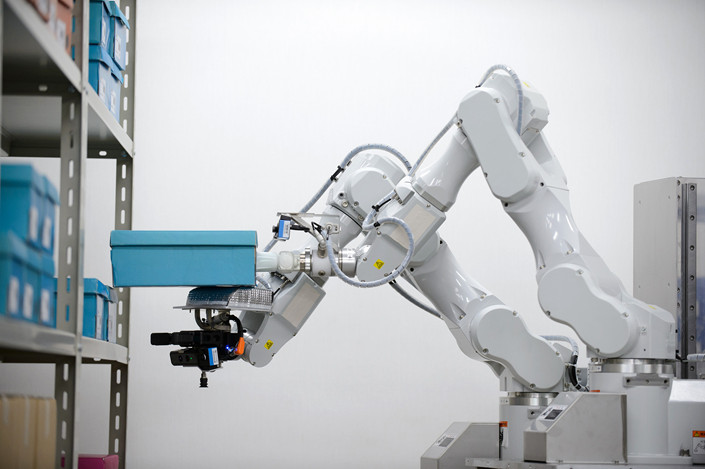AI Unicorn Wades Into Smart Logistics With 2 Billion Yuan ‘River Map’

Not content with being a leader in facial recognition algorithms, Chinese unicorn Megvii Technology has announced it will invest 2 billion yuan ($295.5 million) into developing big-data supply chain systems through its new “River Map” program.
Despite long being known as the world’s factory and having produced e-commerce giants like Alibaba Group Holding Ltd. and JD.com Inc., China’s supply chains are considered bloated and wasteful. Valued by the Chinese Academy of Social Sciences at an estimated 280 trillion yuan last year, they form about 14% of China’s gross domestic product, much more than in developed markets where the sector hovers around 8% to 9%.
This is why Megvii Technology Ltd., also known as Face++, is eager to enter the space. Speaking at an industry conference on Wednesday, the company’s co-founder and CEO Yin Qi announced that it would invest in developing a “River Map” partner system that will share information with partners at various stages of the logistics chain, from manufacturing to human resources, to develop more integrated systems.
“Two billion yuan is an expression of our determination,” said Tang Wenbin, the company’s other co-founder and chief technology officer. He said while the mapping system is still in its infancy, the company aims to connect “downstream” equipment such as robotic handlers and packers in factories with upstream warehouse and shipment management systems, so that they work holistically through an internet of things.
China’s “demographic dividend,” the economic benefit of a large proportion of the population being of working age, is disappearing, CEO Qi explained. But improved flows of data and the opportunity to share information across logistic chains is greater than ever. As more logistics management can be done by machines, it is a good time for a company to enter the market.
Megvii made its first foray into the intelligent robot market in April when it purchased Beijing Ares Robotic Technology Ltd. for an undisclosed fee. But it is not the only company banking on a boom in the internet of things transforming logistics. Alibaba, itself a backer of Megvii, has been pushing into the space as has JD.com, while GLP Pte. Ltd., Asia’s largest warehouse operator, launched a 10 billion yuan fund for developing smart logistics in June last year.
Among the smaller contenders is Shenzhen-based robotics and AI company Dorabot Inc., which is also developing robotic systems for loading and unloading furniture warehouses automatically. Megvii itself acknowledges that the “River Map” idea is not new. Beijing Kejie Logistics Co. Ltd., Alibaba’s Tmall, U.S. company Procter & Gamble Co. are among the businesses developing similar systems.
But one advantage Megvii has is its outsider status, a senior employee at a logistics warehouse told Caixin. Companies might be wary of Alibaba and JD.com due to their sheer scale and influence, whereas Megvii could be easier to work with. On the other hand, given scale of investment on all sides, Megvii’s 2 billion yuan may not give it much clout.
Qiming Venture Partners manager and founder Duane Kuang believes that the sooner Megvii forms an alliance with a bigger partner, the better, because of the depth other players in the industry have. Megvii may have a lot of knowledge of AI technology but it will need to learn much more about the practical aspects of logistics management, he said.
While concerns remain about how increased automation might affect employment, consultancy Accenture nevertheless reckons AI could contribute 1.6 percentage points to China’s economic growth by 2035, with manufacturing, agriculture, and wholesale and retail sectors the biggest beneficiaries.
Megvii, which is seen as one of China’s most promising tech startups, operates the world’s largest facial recognition technology platform, with 300,000 clients around the world. In December Bloomberg reported that it was seeking to raise at least $500 million in additional funding.
Contact reporter David Kirton (davidkirton@caixin.com)

- 1Cover Story: China Carves Out a Narrow Path for Offshore Asset Tokenization
- 2Drownings Shake Chinese Enthusiasm for Travel to Russia
- 3Over Half of China’s Provinces Cut Revenue Targets
- 4Li Ka-Shing’s Port Empire Hit by Forced Takeover Amid Panama Legal Dispute
- 5In Depth: China’s Mutual Fund Industry Faces Overhaul After a Banner 2025
- 1Power To The People: Pintec Serves A Booming Consumer Class
- 2Largest hotel group in Europe accepts UnionPay
- 3UnionPay mobile QuickPass debuts in Hong Kong
- 4UnionPay International launches premium catering privilege U Dining Collection
- 5UnionPay International’s U Plan has covered over 1600 stores overseas






